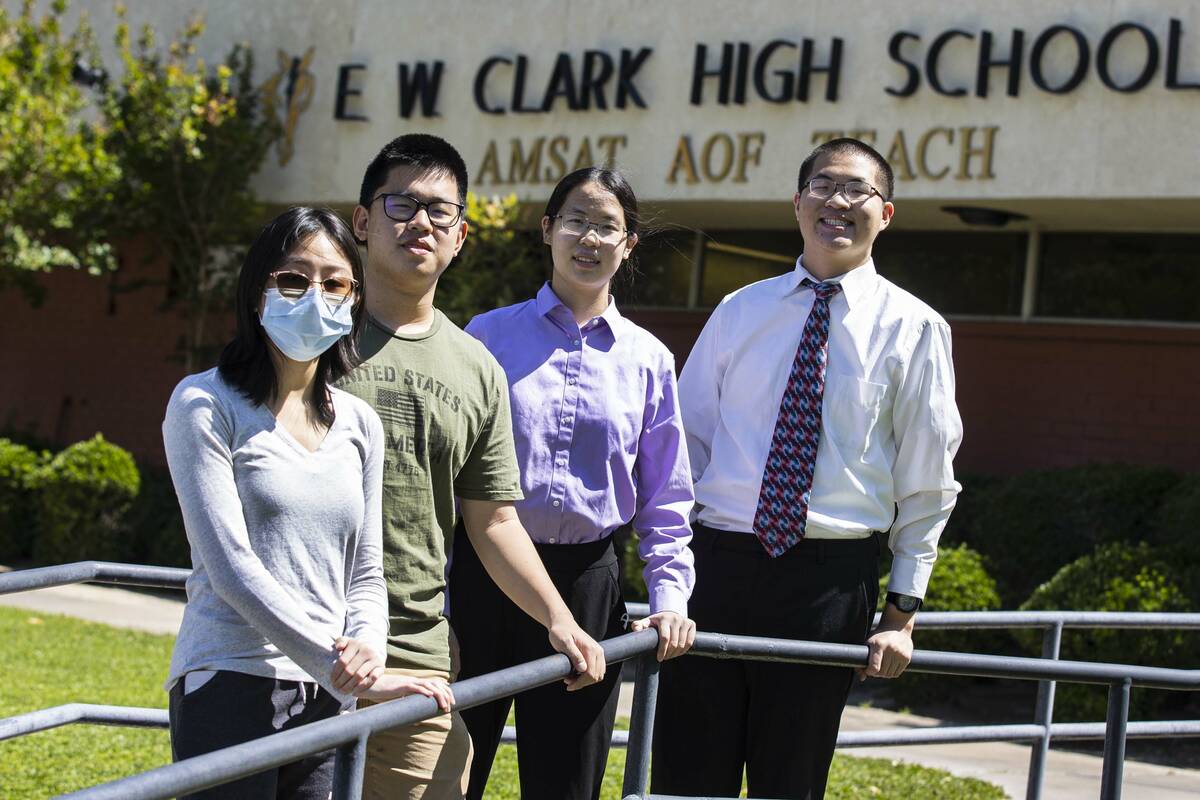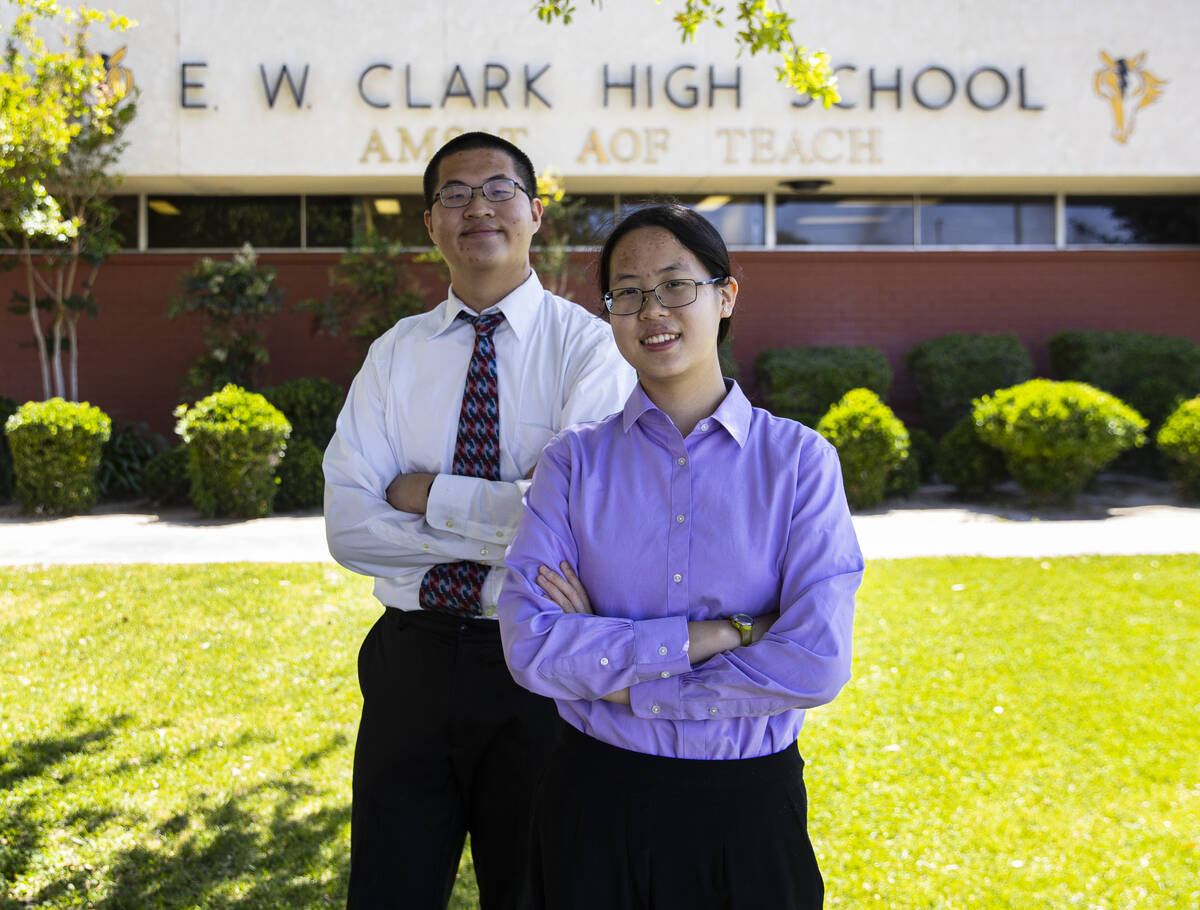Meet the 5 students who got a perfect ACT score at this Las Vegas high school
Grace Hwang was in her calculus class when she and her classmates learned that their ACT scores had just posted. She wasn’t confident in how she performed on the test, expecting to score worse than the first time she took it.
That’s when Grace, a junior at Clark High School, found out she had earned a perfect score on the ACT, one of the less than 0.4 percent of students nationwide who will receive a perfect score.
“I pulled it up, and I just kind of went, ‘Oh my God,’” she said. “And that was basically the rest of the day.”
But Grace wasn’t even the only student in her house to receive the distinction: Her twin brother, Samuel, also earned a perfect score.
Samuel, who said he was “thoroughly ecstatic” upon finding out his score, also joked about the “extreme sibling rivalry” that fueled his and Grace’s performance.
“There was a lot of support between us,” Samuel said. “Granted, yes, there is rivalry, but I think it’s more beneficial in the sense that you have somebody that’s always present that you can benchmark your progress with. Naturally, you don’t want to be second.”
What’s more, the twins are just two of five students at Clark High School who received a perfect score on the test this year, alongside fellow juniors Melodie Cin, Edwin Ma and Hannah Pham.
“It’s so rare. It really is not something that happens often,” Clark Principal Kerry Larnerd said.
Public school education
But for Lee Pham, Hannah’s father, it’s a testament to the Las Vegas public school system that his daughter has been a part of her whole life.
Pham watched as a concerned parent in 2020 as Hannah navigated the last quarter of her freshman year with no instruction, and then again as she spent her entire sophomore year taking classes from home. While he acknowledged that his daughter is naturally a good test-taker, he believes the curriculum and structure that Clark High School provides made his daughter well-prepared for the ACT.
“There’s a lot coming from the student, but the environment with the peer groups and the teachers are helping her,” he said. “You can’t ignore the fact that CCSD did provide availability for rigor and success for a local student.”
But Hannah, a self-motivated student, said she was comfortable doing school at home where she had more time to study and prepare for challenges like Advanced Placement tests, away from some of the distractions at school.
Hannah also credits her success at school to the environment and peers that she’s surrounded by.
“A lot of people strive to do really well, so I think that also influenced me,” she said.
For Larnerd, the principal, a successful student trajectory through public schools shouldn’t come as a surprise.
“I think in public schools there’s excellence everywhere,” Larnerd said. “I think we get a bad rap, for sure, but if you can provide the right supports and help students get on a path that’s going to keep pushing them within their coursework and their classes, then you can get these results. But you can get them anywhere.”
Clark High School has three magnet programs, where students from all over the valley can apply to access specialized programs like math, science or performing arts. All five students are part of Clark’s Academy of Mathematics, Science, Arts and Technology magnet program, and all are taking multiple AP classes this year.
Tina Gridiron, the vice president of ACT’s Center for Equity in Learning, said that when schools provide a rigorous curriculum that students can access, in addition to other resources like study halls and computers to access test preparation, students fare well on the ACT.
“The way that the school is set up and the course path that you’re set up to take, I feel like that definitely does define what classes you’re going to be taking and what people you’re going to be with,” Melodie said.
But a similar classload and a perfect ACT score aren’t the only thing the students have in common. All five are Asian American: Melodie and Edwin are Chinese, Hannah is Vietnamese and the Hwangs are Taiwanese.
‘Model minority’ myth
In recent years, researchers have attempted to dismantle the “model minority” myth that treats Asian Americans as a monolith who have achieved a perceived level of success in American society, often pitting them against other marginalized groups. The stereotype can also discount Asians from lower socioeconomic backgrounds and ignores other barriers these groups still face in American society.
It’s a sentiment that the Clark High School students tried to dispel, as well, saying that, while family dynamics can’t be ruled out as a factor in their success, their families don’t necessarily conform to the traditional stereotypes of Asian parents.
Samuel said he took it upon himself to start preparing for the ACT and SAT, and it wasn’t something he needed prompting from his parents to do.
“To basically say that education is something associated with Asian Americans, it discounts the fact that it’s not something that’s only limited to one ethnic group,” Samuel said. “These skills that you pick up from your family and peers, they can be transferable to other students from different backgrounds.”
Grace said she thinks their parents “kind of got the ball rolling.”
“Afterwards, the momentum kind of just carried it down, and they kind of took a more hands-off approach,” she said.
While it’s impossible to paint a one-size-fits-all picture about the Asian diaspora, aggregate data shows that Asians statistically achieve higher scores on the ACT compared with almost all other students, a reality that was consistent both before and during the pandemic, Gridiron said.
“That was a weight that showed up in surveys that we were doing with students where the perception of discrimination and the barriers of discrimination were voiced by Asian students more often than white students,” she said. “Even in the midst of discrimination, even in the midst of the headline stories that we heard, that Asian students had to wrestle with … we still saw quite a bit of resiliency, quite a bit of intentionality and quite a bit of success in comparison to other groups when you aggregate it.”
Family support
According to Larnerd, one contributing factor is that Asian parents are paying attention, reading every newsletter that comes home, checking grades and attendance, and staying on top of the deadlines for their children’s applications for magnet programs.
“To have family support is the biggest drive for students who take advantage of the opportunities that are in front of them in public education,” the principal said. “It’s more intrinsic for them to do well, to surround themselves with others who want to do well and want to excel.”
But Larnerd also said Asian households statistically have more family units where at least one person has been to college.
“That’s huge when it translates to understanding and navigating that process and providing support for their students,” she said.
But there are also students in the valley with great parents who might be working two shifts and missing communications from the school, the principal said.
“The students or the parent, they don’t know what they don’t know. They’re working so hard that they aren’t able to necessarily find those things,” she said.
It’s also important for students to have support and structure on ACT test day, usually in the form of a family member who will take them to the test, remind them of the things they need to bring with them or even make sure that they eat breakfast that day, Gridiron said.
“Some students have a whole host of individuals that provide those kinds of supports for them on test day, and then some students don’t,” she said.
Ultimately, students have had to contend with a pandemic, negative messages in the news and the uncertainty of their economic situations at home, so the more a school can help to create stability and foster an environment where learning is celebrated, good things will happen for students, she said.
Coming out of the pandemic, Clark has realized that the school has to be that bridge for families, Larnerd said.
“We’ve got to really make sure we have supports in place for our students who want that opportunity to surround themselves with those doing better,” she said. “So how do we make sure it’s in front of them?”
Contact Lorraine Longhi at 480-243-4086 or llonghi@reviewjournal.com. Follow her @lolonghi on Twitter.































